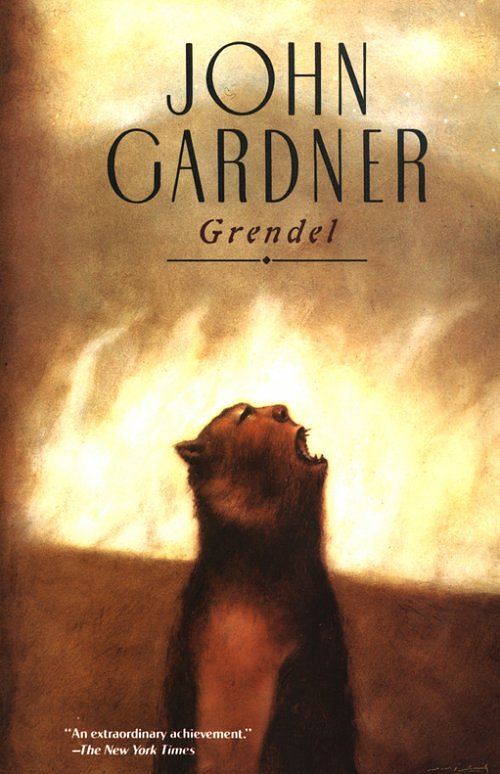[The above is mostly a
reading of the text below, with an occasional aside thrown in for good measure,
as they strike me as relevant. I welcome
questions, comments, or concerns about the material contained in this video.]
“Grendel” is, of course, John Gardner’s wonderful re-telling of the great Anglo-Saxon (i.e., Old English) poem “Beowulf” (c. 675-1025 CE). It is one of the few truly successful parallel novels – the literary form that reconfigures the action of a story that the audience is already presumably familiar with – that I have ever encountered. Gardner was a medievalist by training, but I wouldn’t be surprised if he was familiar with the Anglo-Saxon of “Beowulf,” too. The book makes it clear that he has lived inside and with the character of Grendel for a long time, which only results in a richer, fuller reimagining of Grendel’s sense of deep curiosity and existential despair at his own position in the world.
This could have been a simple, straightforward narrative account of the action of “Beowulf” through Grendel’s eyes, but Gardner imbues Grendel with all the philosophical wonder and bewilderment of a human being, which makes him all the more poignant. When Grendel sees the Shaper (a literal translation of “Scop,” the Anglo-Saxon bard who sings in Hrothgar’s mead-hall) sing songs of heroic victory, he becomes incensed at how the Danes contort reality for their own purposes in their songs. “Why do they lie to themselves like this?” he asks. He encounters a brilliant dragon who happens to have a keen grasp of medieval Scholastic philosophy who explains to him that the job of the Shaper is to convince humans that their reality is in fact real. Out of this conversation comes some beautiful revelations about the art of mythopoiesis, the nature of storytelling, and art itself. When Grendel is unable to accept the dragon’s fatalistic view of the universe, he characteristically storms off, angered, confused, and in denial.
Since raw, brute power plays a not insignificant role in the Anglo-Saxon world, it’s no surprise that there is a discussion of political philosophy, too, in which the Hobbesian view eventually wins out. Grendel defends his relentless attacks on the mead-hall by saying that he is the force in their lives which gives them meaning, and therefore it is only his continued carnage against the thegns of Hrothgar’s hall that continues to let the Shaper sing the stories he sings, and therefore allows them to remain human. Regardless of what you think of this rationalization of violence, you have to admit that it has a sheer logical force of its own. To think that those in the mead-hall only feared his strength and size when they should have feared his power of reason makes for a truly formidable monster. Later, there is another conversation on the nature of religion with a priest, which again fills Grendel with a sense of existential dread.
Behind all of these characters rests Grendel’s mother – a minor but wholly compelling figure - holding down the marshy fen as only a protective mother could and whose inability to speak frustrates her son, reminding him of his distance from humanity, yet of the persistence of his reason.
I waited until I read “Beowulf” to read this, and while “Grendel” would be enjoyable for anyone, it will be more wonderful still to someone who has invested themselves in a careful reading of the original poem; it provides a narrative framework which allows the reader to focus less on the action of the story – really not the most important part of Gardner’s version by far – and instead focus on the tender, passionate humanization of Grendel himself.

No comments:
Post a Comment